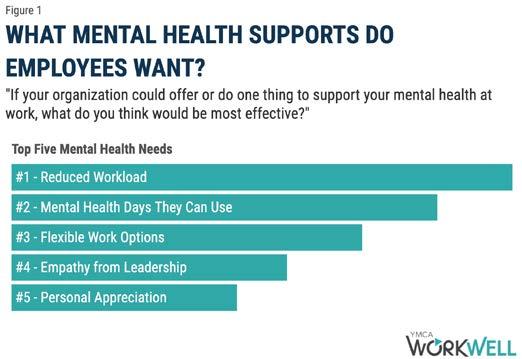
2 minute read
The Depleted, Overworked, and Underappreciated
Nearly two years into COVID-19, it can be easy to forget everything employees in our communities have been through. We've seen businesses in our communities temporarily close their doors due to the pandemic multiple times, and too many close their doors for good. We've seen the rise of “work from home” and the start of the “return to work”. Many of us have had to connect with people through computer screens, many more of us have had to connect with people from behind plastic dividers and masks. We've seen the start of the “Great Resignation”, with employees leaving their jobs in record numbers, and the rise of the “Burnout Epidemic”, with employees experiencing burnout more than ever before. It is safe to say that our collective well-being at work has been significantly challenged since the start of the pandemic.
At YMCA WorkWell, we’re on a mission to improve the state of workplace well-being in the communities we serve – and beyond. This all starts with good data. We have been measuring employee well-being in our region since the start of the pandemic and we’ve released our 2nd Insights to Impact Report to share what we learned from our most recent survey of 1800+ working adults.
Our results made one thing clear: The landscape of work has changed. Employees in our region are feeling more overworked and underappreciated than ever and it is impacting mental health.
When discussing “mental health supports”, many leaders are quick to jump to traditional supports like Employee Assistance Programs – a critical component of any effective well-being strategy. It is important to note, however, that when asked, most respondents were looking first and foremost for upstream solutions to minimize their stress at work rather than downstream initiatives to help them manage that stress. In fact, 49% of respondents cited a reduced workload or better access to mental health days as the most effective way to support their mental health at work – every second respondent.
We see this in other areas in the data too: The top three needs to be healthier at work identified by respondents were a need for better work-life balance, a more manageable workload, and more personal appreciation.
So, what does this mean? Things will not just go back to the way they were on the other side of COVID-19, and leaders cannot simply wait for the return of “what was”. But, we also believe that even the most daunting data is good data if it can inspire action.
We know what employees need. Let this data be the spark that we need to take these challenges seriously and to stop trying to fix upstream problems with only downstream solutions. Our communities cannot be healthy if we aren’t healthy at work too, so let’s take the purposeful and targeted action that we need to really turn this around. It’s time to take it seriously.
To read the full report, to learn where to start, and to learn more about how we help, visit https://www.ymcaworkwell.com/insights-to-impact-2021.
ABOUT THE AUTHOR Dave Whiteside
Dave Whiteside is the Director of Insights at YMCA WorkWell and the YMCA of Three Rivers. A true Waterloo Region lover, he earned his Ph.D from Wilfrid Laurier and has been set on improving employee wellbeing in our region ever since.





